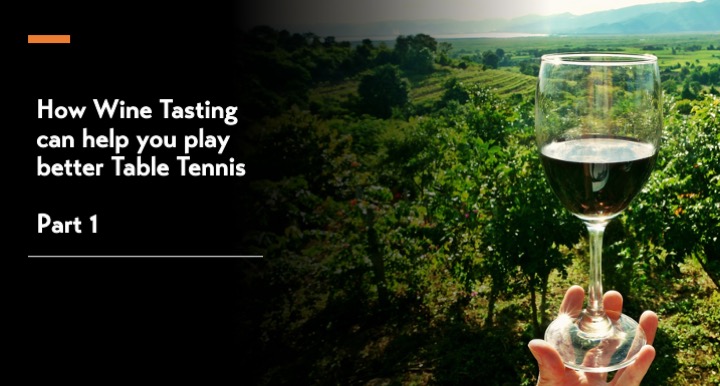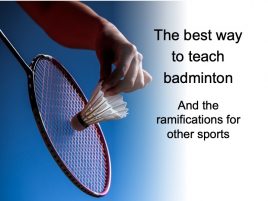
How Wine Tasting can help you play better Table Tennis. Part 1
Okay. I’m not saying you should have a few glasses before a game.
What I am saying is if you know what helps you be better at Wine Tasting – and why – you’ll know what sort of practice and training to do so you get the best results in a game.
Let’s look at an experiment to show you what we mean.[1]
A very simple experiment
Get them to taste the first wine
An experiment was carried out with enthusiastic but untrained wine drinkers. [1] They were divided into two groups and they all tasted a certain red wine.
One group wrote down a detailed description of the wine. The other group didn’t take any notes. Instead, they did a crossword. That’s right, a crossword.
Get them to pick the wine out of a group
Both groups were then given four very different wines to taste – in unmarked glasses of course. And here’s the thing: one of them was the very wine they’d all just tasted.
Their job was simple. It was to pick out the first wine they tasted from the four wines. Given the wines were very different, it was expected to be fairly easy – at least for the group who wrote down a description of the wine.
Find out which group did best
But guess what? The drinkers who wrote a description of the wine, did no better than chance. That is, they did no better than guessing or tossing a coin.
And surprisingly, the drinkers who did the crossword, did almost as good as a trained wine taster.
What? How can this be?
Verbal and Olfactory Memories
When we drink wine, we usually don’t make written and detailed notes about its distinguishing characteristics. We don’t take notes about things like colour, bouquet, sweetness, dryness, fruit flavours and the presence of tannins.
And we don’t have to. It’s because our subconscious mind automatically takes care of it for us. It constructs a mass of neural networks to keep what we smell in our storehouse of olfactory memories in our long-term memory.
If we drink this particular wine again, it’s our olfactory memory that’s likely to remember it. And it does it without needing to refer to any verbal description or written notes.
However, in our wine tasting experiment, the drinkers who put the features of the first wine into words had unknowingly created a separate neural network of verbal memories.
And it’s the competition between the olfactory and verbal memories that got in the way of these drinkers recognizing the wine they previously tasted.
So what should you do when you’re training?
Unfortunately, way too many players let verbal memories interfere with – or take over and dominate – the memories they actually need to be creating.
So how do you make sure it doesn’t happen to you? How do you make sure when you’re training for Table Tennis, or for other sports for that matter, you make the right memories?
The research tells us what you need to do less of, and what you need to do more of. And I’ve been collecting what the research tells us and putting it together for you.
Now it’s time to check out Part 2.
[1] Melcher J.M. & Schooler J.W. The misremembrance of wines past: verbal and perceptual expertise differentially mediate verbal overshadowing of taste memory. Journal of Memory and Language, 35, 231-245, 1996.



